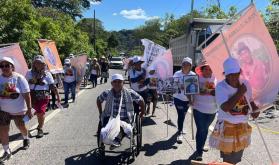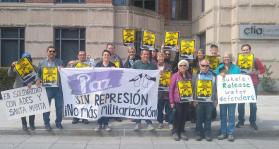teleSUR: FMLN Government Prioritizes Social Spending
Article reprinted with permission from teleSUR: Original article posted on Oct 10, 2018
President Salvador Sánchez-Cerén has managed to create a sustainable economy, while at the same time lowering the rates of extreme poverty in just four years.
The Farabundo Martí National Liberation Front (FMLN) has been El Salvador’s leading political force since the March 2009 electoral victory of Mauricio Funes, whose running mate, Salvador Sánchez-Cerén, is now president and during their administrations has managed to transform, in large part, the system inherited from the previous conservative government.
The FMLN administrations have developed health, economic, and social improvements with a sustainable economic growth outlook of over 2.3 percent for 2019.
The FMLN, under the direction of President Salvador Sánchez-Cerén, has implemented numerous policies to socialize government systems in support of Salvadoran families and children, among which the reduction of crime, violence, and poverty stand out.
For their part, FMLN legislators in the Legislative Assembly have promoted laws and amendments to guarantee basic human rights to the population, as well as improving wages and strengthening judicial protections, among other policies, in order to fulfil the government plan Sánchez-Cerén’s laid out in 2014.
Decrease in poverty and social subsidies
Poverty rates have decreased by more than seven percent, from 40 to 32.7 percent, between 2017 and 2018, thanks to the development of social programs directed at the most vulnerable individuals and families (representing 46% of the national budget).
In the case of extreme poverty, the rate was reduced from 12.4 to 7.9 percent, meaning that 244,000 Salvadorans are no longer in extreme poverty.
Social assistance has been extended with the development of the Inclusive Full-Time School Program, in which shoes, uniforms, school supplies, computers, and snacks are delivered to students.
Likewise, the rates of chronic malnutrition in children younger than ten years of age have been reduced by more than 42 percent.
Wage increases and jobs
Since 2009, more than 205,000 jobs have been created, while more than 135,000 informal merchants have been able to register with the Salvadoran Social Security Institute (ISSS).
Likewise, since 2011, the minimum wage in both the private and public sectors has increased by more than 40%, depending on the type of work and profession.
With respect to retired workers, the minimum pension payments increased by 43 percent, in addition to the basic monthly pensions that are being provided to 32,400 to older adults in conditions of extreme poverty.
Security and the fight against corruption
During his tenure, Sánchez-Cerén's government has promoted the “Safe El Salvador” security plan to confront criminal gangs and reduce the rates of violence. Security policies spurred by the President include:
● The creation of the National Council for Citizen Security and Coexistence to promote violence prevention and the Specialized Reaction Force “El Salvador” (FES) for the disarmament of violent groups
● The reduction of the homicide rate by more than 25%
● The creation of an office to provide service to women who are victims of domestic violence
● The design of a new penitentiary system focused on social reintegration
Economic development
In economic matters, the FMLN government has made progress in:
● Recovery of national production
● Increase in imports by more than 38%.
● The designation of more than 70,000 properties for agricultural use (especially for coffee and the export of apples).
● Stability and control of inflation, which has been maintained at two percent, since 2017.
General health
Health has been one of the areas prioritized by the FMLN government. During the current government:
● More than 421 health care centers have been installed in rural and marginalized villages, in addition to the creation of 576 Community Family Health Teams (ECOS) operating in 187 municipalities of the country.
● Through the health reform, the "voluntary donation" required to access any public health service in El Salvador was eliminated.
● More than five national hospitals and 433 health care centers have been inaugurated.
Read the original here in Spanish. English translation by CISPES.

 "I am a CISPES supporter because continuing to fight for social justice and a more people-centered country means continuing the dream and sacrifice of thousands of my fellow Salvadorans who died for that vision.” - Padre Carlos, New York City
"I am a CISPES supporter because continuing to fight for social justice and a more people-centered country means continuing the dream and sacrifice of thousands of my fellow Salvadorans who died for that vision.” - Padre Carlos, New York City

